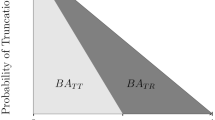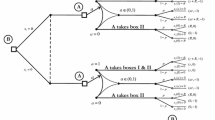Conclusion
Much of the social choice literature has tried to skirt around the main conclusion which it has come up with. The literature seems to imply that the world is in disequilibrium, yet it keeps trying to model the process in terms of equilibrium models and to search for conditions which guarantee equilibria. The conditions which have been found for equilibrium when only pure strategies are used are so servere, we would seldom expect them to be met. But if the conditions for equilibria over pure strategies are servere, then the conditions for equilibria over risky strategies must be even more so, for risky strategies can, atbest, disrupt existing equilibria. In this paper, we have attempted to accept the deductions of the model, and to investigate, instead, the implications of this lack of equilibrium. We have argued that, in a large class of situations, it seems that we will get convergence in risk even if there is no euqilibrium. Moreover, the point to which the risk will converge may not be entirely arbitrary, i.e., the area of intransitivities, given that candidates adopt optimal responses to each other, may be a fairly localized region in the space.
Similar content being viewed by others
References
Davis, O. A., M. J. Hinch, and P. C. Ordeshook, “An Expository Development of a Mathematical Model of the Electoral Process,”American Political Science Review, 64, 2 (June 1970).
Fishburn, Peter C., “Lotteries and Social Choice,”Journal of Economic Theory 5,2 (October 1972), 189–207.
Friedman, Milton, and L. J. Savage, “The Utility Analysis of Choices Involving Risk,”Journal of Political Economy 56 (1948), 279–304.
McKelvey, Richard D., “Policy Related Voting and Electoral Equilibrium,”Econometrica (forthcoming).
--Some Extensions and Modifications of the Spatial Model of Party Competion, (Ph.D dissertation, University of Rochester, 1972a)
Plott, Charles R., “A Notion of Equilibrium and its Possibility Under Majority Rule,”American Economic Review, 57 (1967), 787–806.
Shepsle, Kenneth A., “A Note on Zeckhauser's ‘Majority Rule with Lotteries on Alternatives’: The Case of the Paradox of Voting,”Quarterly Journal of Economics 84, 1970, 705–709.
-- “The Strategy of Ambiguity: Uncertainty and Electoral Competition,”American Political Science Review, 66,2 55–568.
Zeckhauser, Richard, “Majority Rule with Lotteries on Alternatives,”Quarterly Journal of Economics 83, 1969, 696–703.
Author information
Authors and Affiliations
Additional information
We wish to thank Alvin Rabushka for some stimulating discussions which helped shape our thoughts on equilibrium models of social choice.
Rights and permissions
About this article
Cite this article
McKelvey, R., Richelson, J. Cycles of risk. Public Choice 18, 41–66 (1974). https://doi.org/10.1007/BF01718496
Issue Date:
DOI: https://doi.org/10.1007/BF01718496




